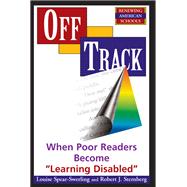Off Track: When Poor Readers Become ""Learning Disabled""
, by Spear-swerling,Louise- ISBN: 9780813387574 | 0813387574
- Cover: Nonspecific Binding
- Copyright: 1/27/1997
The identification of poor readers as "learning disabled" can be the first of many steps toward consigning students to a lifetime of reading failure. The very label that is meant to help children often becomes a burden that works against effective learning throughout their schooling.In this book, the authors identify the dangers of labeling children as reading or learning disabled, contending that a "reading disability" is not a unitary phenomenon. In order to diagnose and help children, educators and parents need to understand the multiple sources of reading difficulty before they can choose appropriate means to correct it.Drawing on recent research in cognitive psychology, the authors present a new theoretical model of reading disability that integrates a wide variety of findings across age and grade spans. Laid out in terms that are readily comprehensible to parents and practitioners, the model outlines the phases that are characteristic of the path to proficient reading, then describes five ways in which disabled readers may stray from this path. The key to the authors' work lies in fact that youngsters who stray from the path of normal reading acquisition often are not distinguishable from other children who are classified as "poor readers" rather than as "learning disabled." This model is an especially useful one for practitioners because it both provides a broader view of reading disability than have many previous models and shows how reading disability relates to normal reading acquisition. Using illustrative case studies, the authors describe the five types of reading disabilities, explain how to properly assess them, and suggest ways to conquer them.






